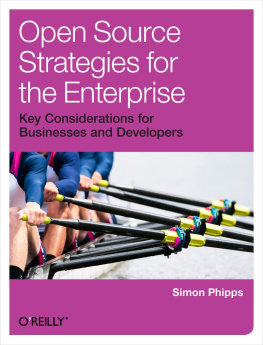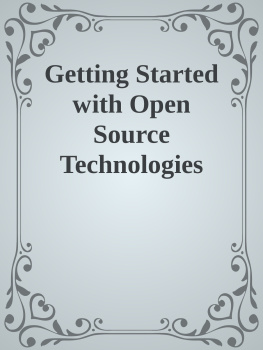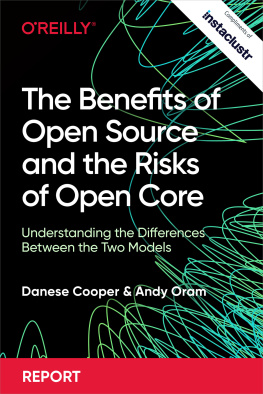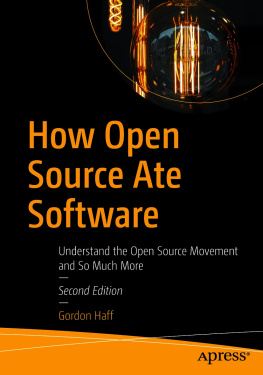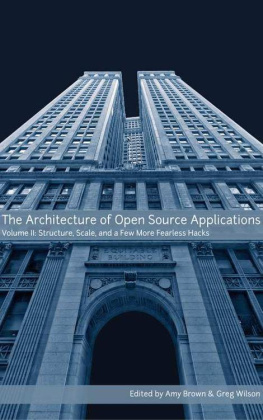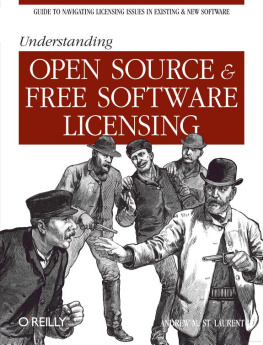Karl Fogel - Producing Open Source Software
Here you can read online Karl Fogel - Producing Open Source Software full text of the book (entire story) in english for free. Download pdf and epub, get meaning, cover and reviews about this ebook. year: 2021, publisher: OReilly, genre: Politics. Description of the work, (preface) as well as reviews are available. Best literature library LitArk.com created for fans of good reading and offers a wide selection of genres:
Romance novel
Science fiction
Adventure
Detective
Science
History
Home and family
Prose
Art
Politics
Computer
Non-fiction
Religion
Business
Children
Humor
Choose a favorite category and find really read worthwhile books. Enjoy immersion in the world of imagination, feel the emotions of the characters or learn something new for yourself, make an fascinating discovery.

- Book:Producing Open Source Software
- Author:
- Publisher:OReilly
- Genre:
- Year:2021
- Rating:3 / 5
- Favourites:Add to favourites
- Your mark:
- 60
- 1
- 2
- 3
- 4
- 5
Producing Open Source Software: summary, description and annotation
We offer to read an annotation, description, summary or preface (depends on what the author of the book "Producing Open Source Software" wrote himself). If you haven't found the necessary information about the book — write in the comments, we will try to find it.
Karl Fogel: author's other books
Who wrote Producing Open Source Software? Find out the surname, the name of the author of the book and a list of all author's works by series.
Producing Open Source Software — read online for free the complete book (whole text) full work
Below is the text of the book, divided by pages. System saving the place of the last page read, allows you to conveniently read the book "Producing Open Source Software" online for free, without having to search again every time where you left off. Put a bookmark, and you can go to the page where you finished reading at any time.
Font size:
Interval:
Bookmark:
Copyright 2005-2019 Karl Fogel, under the CreativeCommons Attribution-ShareAlike (4.0) license.
Version: 2.3214
Home site: https://producingoss.com/
This book is dedicated to two dear friendswithout whom it would not have been possible: Karen Underhill and JimBlandy.
At parties, people no longer give me a blank stare when I tellthem I write free software. "Oh, yes, open source like Linux?"they say. I nod eagerly in agreement. "Yes, exactly! That's what Ido." It's nice not to be completely fringe anymore. In the past, thenext question was usually fairly predictable: "How do you make moneydoing that?" To answer, I'd summarize the economics of open source:that there are organizations in whose interest it is to have certainsoftware exist, but that they don't need to sell copies, they justwant to make sure the software is available and maintained, as a toolinstead of as a rentable monopoly.
The next question is not always about money, though. Thebusiness case for open source software is no longer somysterious, and even non-programmers already understand or atleast are not surprised that there are people employed at itfull time. Instead, the next question is often " Oh, what'sthat like? "
I didn't have a satisfactory answer ready, and the harder Itried to come up with one, the more I realized how complex a topic itreally is. Running a free software project is not exactly likerunning a business (imagine having to constantly negotiate the natureof your product with a group of random people of diverse motivationsand interests, most of whom you've never met!).Nor, for various reasons, is it exactly like running atraditional non-profit organization, nor a government. It hassimilarities to all these things, but I have slowly come to theconclusion that free software is suigeneris . There are many things with which it can beusefully compared, but none with which it can be equated. Indeed,even the assumption that free software projects can be "run" is astretch. A free software project can be started ,and it can be influenced by interested parties.But its assets cannot be made the property of any single owner, and aslong as there are people somewhere anywhere interested incontinuing it, it can never be unilaterally shut down. Everyone hasinfinite power; everyone has no power. It's an interestingdynamic.
That is why I wanted to write this book in the first place, and,a decade later, wanted to update it. Free software projects haveevolved a distinct culture, an ethos in which the liberty to make thesoftware do anything one wants is a central tenet. Yet the result ofthis liberty is not a scattering of individuals each going their ownseparate way with the code, but enthusiastic collaboration and frequent compromise. Indeed,competence at cooperation itself is one of the most highly valuedskills in free software. To manage these projects is to engage in akind of hypertrophied cooperation, where one's ability not only towork with others but to come up with new ways of working together canresult in tangible benefits to the software and the community that develops it. This book attempts todescribe the techniques by which this may be done. It is by no meanscomplete, but it is at least a beginning.
Good free software is a worthy goal in itself, and I hope thatreaders who come looking for ways to achieve it will be satisfied withwhat they find here. But beyond that I also hope to convey somethingof the sheer pleasure to be had from working with a motivated team ofopen source developers, and from interacting with users in thewonderfully direct way that open source encourages. Participating ina successful free software project is a deep pleasure, and ultimatelythat's what keeps the whole system going.
.
This book is meant for managers and software developers who areconsidering starting an open source project, or who have started oneand are wondering what to do now. It should also be helpful forpeople who just want to participate in an open source project but havenever done so before.
The reader need not be a programmer, but should know basicsoftware engineering concepts such as APIs, source code, compilers, andpatches.
Prior experience with open source software, as either a user ora developer, is not necessary. Those who have worked in free softwareprojects before will probably find at least some parts of the book abit obvious, and may want to skip those sections. Because there'ssuch a potentially wide range of audience experience, I've made aneffort to label sections clearly, and to say when something can beskipped by those already familiar with the material.
Much of the raw material for the first edition of this book camefrom five years of working with the Subversion project (), in early 2000,and thank goodnessCollabNet understood right from the start how to run it as a trulycollaborative, distributed effort. We got a lot of developer buy-in early on; today the majority of developers on theproject are not CollabNet employees.
Subversion is in many ways a classic example of an open sourceproject, and I ended up drawing on it more heavily than I originallyexpected. This was partly a matter of convenience: whenever I neededan example of a particular phenomenon, I could usually call one upfrom Subversion right off the top of my head. But it was also amatter of verification. Although I am involved in many other free softwareprojects to varying degrees, and talk to colleaguesinvolved in many more, one quickly realizes when writing for printthat all assertions need to be fact-checked. I didn't want to makestatements about events in other projects based only on what I couldread in their public discussion archives. If someone were to trythat with Subversion, I knew, she'd be right about half the time andwrong the other half. So when drawing inspiration or examples from aproject with which I didn't have direct experience, I tried to firsttalk to an informant there, someone I could trust to explain what wasreally going on.
While Subversion was my full time job from 2000-2006, I've beeninvolved in free software for more than twenty-five years. Other projects and organizations that have influencedthis book include:
The GNU Emacs text editor project at the Free Software Foundation.
Concurrent Versions System (CVS), which I worked on intensely in 19941995 with Jim Blandy and was involved with intermittently for a few years afterwards.
The collection of open source projects known as the Apache Software Foundation, especially the Apache Portable Runtime (APR) and Apache HTTP Server.
The Launchpad.net project at Canonical, Ltd.
Code for America and O'Reilly Media, which gave me an inside view on open source civic technology development starting in 2010, and kindly kept me in the loop after I became a full-time consultant at Open Tech Strategies, LLC around 2012.
The many open source anti-surveillance and censorship-circumvention tools supported by the Open Internet Tools Project (OpenITP.org) and by the Open Technology Institute at the New America Foundation.
Checkbook NYC, the municipal financial transparency software released by the New York City Office of the Comptroller.
The Arches Project, an open source geospatial web application for inventorying and helping protect cultural heritage sites (e.g., historic buildings, archeological sites, etc), created by the Getty Conservation Institute and World Monuments Fund.
Font size:
Interval:
Bookmark:
Similar books «Producing Open Source Software»
Look at similar books to Producing Open Source Software. We have selected literature similar in name and meaning in the hope of providing readers with more options to find new, interesting, not yet read works.
Discussion, reviews of the book Producing Open Source Software and just readers' own opinions. Leave your comments, write what you think about the work, its meaning or the main characters. Specify what exactly you liked and what you didn't like, and why you think so.

